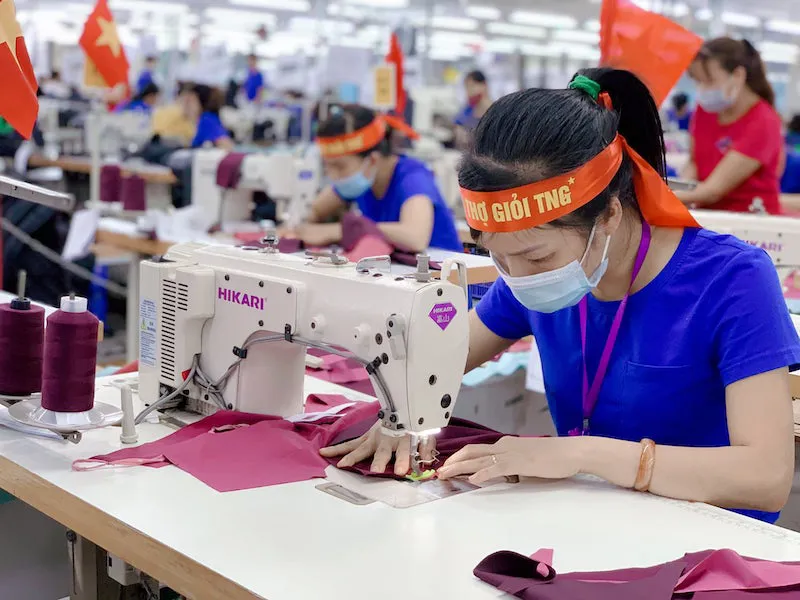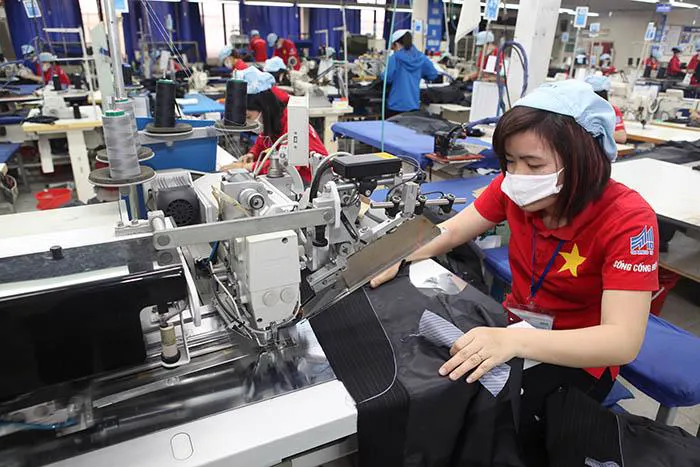Raw material trading center boosts competitiveness of Vietnamese footwear industry
Companies face significant challenges in complying with requirements set by free trade agreements.
Local insiders suppose the establishment of a raw material trading center would address the challenge of sourcing inputs, allowing the industry to enhance its competitiveness and achieve steady recovery.
Establishment of a material trading center
Local workers at TNG Dong Hy Factory. Photo: TNG |
Nguyen Duc Thuan, Chairman of the Vietnam Leather, Footwear, and Handbag Association (Lefaso) believes that the trading center is considered a breakthrough in the supply of raw materials and supporting industries while helping promote transparency in the material market.
This will enable enterprises to improve their efficiency and engagement in the supply chain as it facilitates the recovery and development of the industry in the future," he said.
Le Trieu Dung, Chairman of the National Competition Commission under the Ministry of Industry and Trade (MoIT), said the trading center for the footwear industry is in line with practical needs. With this center, Vietnamese enterprises will strengthen their capacity and increase competitiveness.
The move is significant in the context that the footwear industry has been mainly driven by foreign-invested enterprises. As a matter of fact, Vietnamese enterprises may lose out at home without supportive measures.
In this regard, Truong Thanh Hoai, Director General of MoIT's Industry Agency, mentioned that the government has set a target for the development of supporting industries, including the establishment of three centers for mechanical industries and two for textile, garment, and footwear industries.
"The textile, garment, and footwear transaction centers are ready to get built," he said.
In 2022, the Prime Minister approved the Strategy for the Development of Vietnam's Textile, Garment, and Footwear Industry until 2030, with a vision until 2035.
The MoIT is also drafting a sustainable development program for the textile, garment, and footwear industry to be submitted to the Prime Minister for approval, according to Minister of Industry and Trade Nguyen Hong Dien.
Previously, the government issued Decree No.111 on the development of supporting industries, in which the leather and footwear industry is one of the six industries that enjoy priority policies for investment in the production of materials and components.
Facing multiple challenges
| Garment exports produced at May 10 JSC. Photo: Thanh Hai/The Hanoi Times |
The General Statistics Office reported that the country's leather and footwear exports rose 5.7% to US$6.5 billion in the first four months of this year. It indicates the industry's impressive recovery.
Vietnam is the third largest footwear producer (after China and India) and the second largest footwear exporter in the world, according to the Vietnam Leather, Footwear, and Handbag Association (Lefaso). However, the industry will likely suffer from new regulations imposed by footwear import markets in 2024.
Companies face challenges in complying with requirements set by free trade agreements because they rely heavily on imports of raw materials and supplies from China, South Korea, and Southeast Asian countries.
In addition, footwear import markets have been placing more conditions on imported products, particularly in terms of social responsibility and environmental protection. The EU market introduced new requirements in March, focusing on eco-design, sustainability, and supply chain traceability.
Trinh Anh Tuan, Director General of the Trade Remedies Authority under the Ministry of Industry and Trade, said the US has introduced a policy that allows the investigation of subsidies that are not in line with market conditions. As a result, when exporting countries like Vietnam source raw materials and supplies from a third country that receives subsidies for their production, the exported goods are subject to punitive taxation.
The EU is considering following suit. This poses a significant challenge for the footwear industry as the majority of companies are small or medium-sized and cannot participate in the global value chain.
According to local insiders, the demand for transparent supply chain traceability information is not confined to a small number of markets. Instead, it emerges as a global trend that is having a profound impact on companies in the footwear industry.
Nguyen Duc Thuan, Chairman of Lefaso, said that another major challenge is the weak supply of supporting industries. Most enterprises are mainly engaged in processing low-value-added products without a well-established raw materials industry.
In this regard, a trading center will help, he emphasized.
The Ministry will work with Lefaso to develop a project on establishing a commodity trading center.













